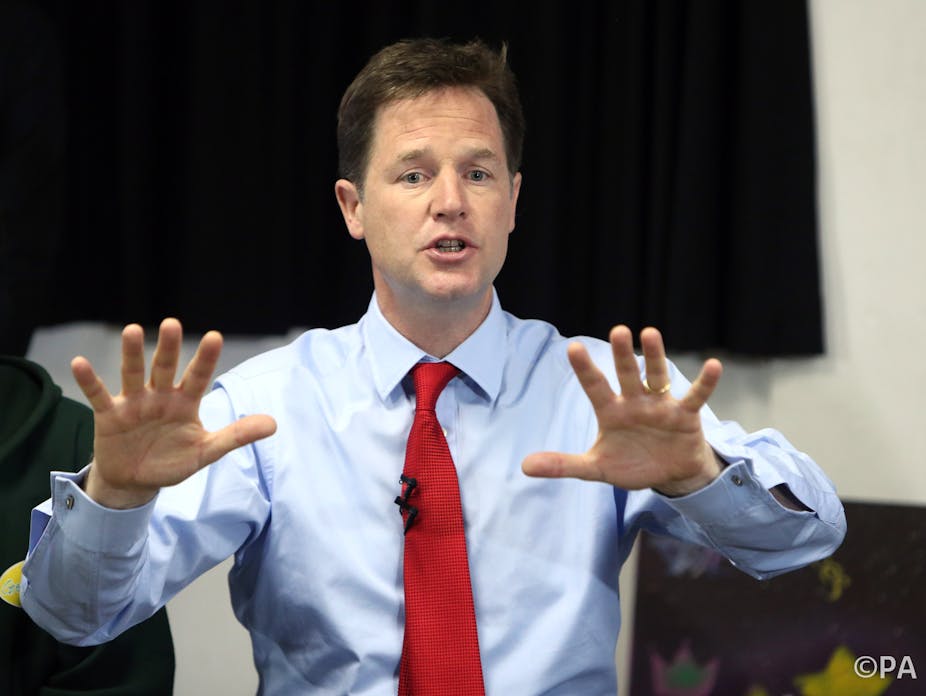It has now been a few weeks since the Liberal Democrats were, broadly speaking, humiliated at the local and European elections. This humiliation was repeated at the subsequent Newark by-election, although the majority of coverage has focused on congratulating the Tories on winning a safe seat and not enough on the fact that the Lib Dem candidate lost his deposit.
There were already grumblings of growing intensity from Lib Dem members about the leadership of Nick Clegg after the local and European elections. But after the botched coup attempt by Lord Oakeshott, ironically, his position feels more secure after his supporters circled the wagons and mounted attacks on those people calling for his head. And even after Newark there was a sense that the moment to replace him as leader had been missed.
So the Lib Dems are left with a lame-duck leader who has no connection with the public and no obvious strategy to develop one. Credibility and character are fundamental for any politician trying to build support in the community. David Cameron has successfully defined himself as a small “l” liberal Conservative in charge of a government that is successfully delivering an economic recovery. Miliband, meanwhile – who has leadership issues of his own – draws upon his beliefs in social democracy and the intellectual credentials of Labour’s ideological renewal vis-à-vis his One Nation vision.
Clegg, meanwhile, has lost his narrative. His argument for joining the Coalition was that the Lib Dems would finally be a party of government. The Lib Dems would have hoped that some of the credit from the improving economic numbers would rub off on them. But this plan has been undermined by the way the Tories have managed to dominate the economic agenda, which has meant they’ve been able to take ownership of any positive narrative deriving from the economy.
Credibility deficit
The Lib Dems’ expectation and hope was to repeat the experience of Labour in Churchill’s government, which demonstrated to the electorate that Labour was a credible governing force. Unfortunately they have failed because the electorate simply does not believe Clegg; they think he cannot be trusted because he changed his mind on economic strategy prior to the general election yet continued making arguments which ran counter to this change.
He lost credibility because he had promised to oppose any rise in tuition fees and gave way on that, too. He is also seen as detached from the agenda of the rest of society: styling the Lib dems as the party of “in” and focusing on unsuccessful campaigns for AV and Lords reform – when what everyone really wanted was a sign the economy was on the mend, something he has failed to win any credit for.
On Europe, rightly or wrongly, the arguments of Cameron (who wants to remain in a radically reformed Europe) and Farage (who simply wants out) resonate far more with the electorate.
As a result of this and the various broken promises or ditched campaigns, Clegg – who rode high in 2010 on his promises to bring a “new style of politics” has simply confirmed a perception in the mind of the electorate that politicians can’t be trusted. Meanwhle Farage is winning ever-stronger support on the basis that his “straight talking” puts fresh air between him and the “professional politicians”.
Lib Dems’ ostrich moment
Clegg’s failure to fall on his sword after three poor election results in quick succession is now reinforcing the message that, far from being a party that listens, the leadership is now burying its head in the sand. There is no evidence that the are preparing to change the approach that brought about humiliation in the European elections, the local council election and, last week, at Newark. Maintaining confidence in this message speaks to Einstein’s definition of madness, that repeating the same action over and over in the hope of different results will produce a winning strategy.
Because Clegg has little remaining political currency left with the audience, convincing them of anything will be very difficult. Even if the argument he is advancing is intellectually or politically valid he will not be able to convince the electorate because he is, for lack of a better description, seriously damaged goods. This is compounded by a party membership which is increasingly disgruntled by his approach. That membership will be expected to show its support in the conference season and into the general election campaign when they will be expected to mobilise to knock on doors. At the moment it’s looking as if Clegg is fast approaching a position where he is incapable of firing up his party in the run up to the general election.
If the Lib Dems continue hemorrhage support, they can expect to lose more than half of their seats. This will inevitably be spun as not as bad as it could be. But it all looks a bit sick when you think that the reason they went into coalition with the Conservatives was to become a party of government and attract increased support, not lose it hand over fist.
So what can be done? The moment for change has come and gone, now all they can do is press on. The result may be devastating, but regardless of how bad it is, it could always have been worse.

